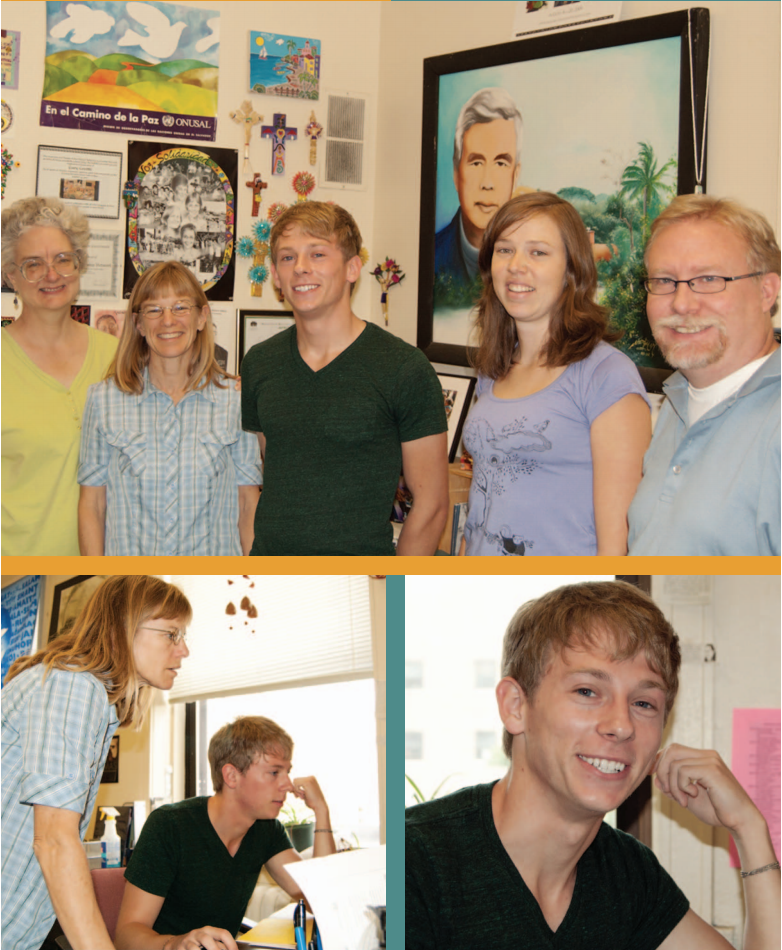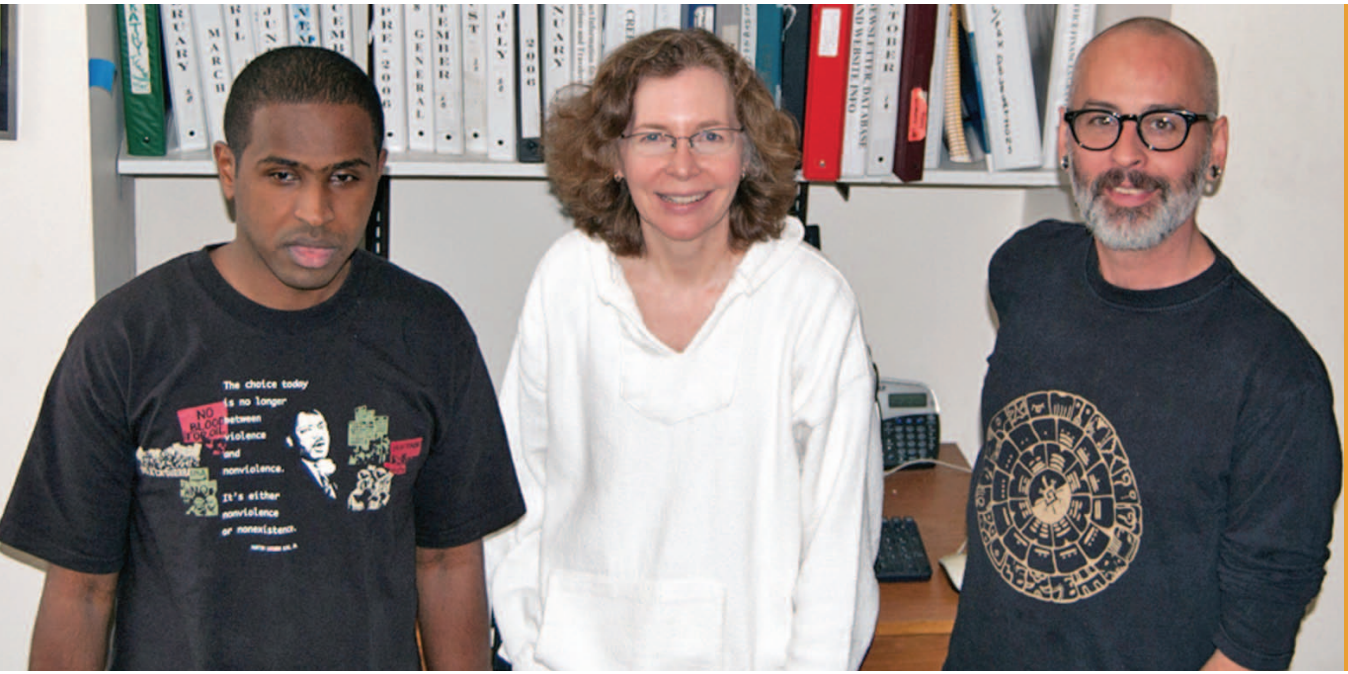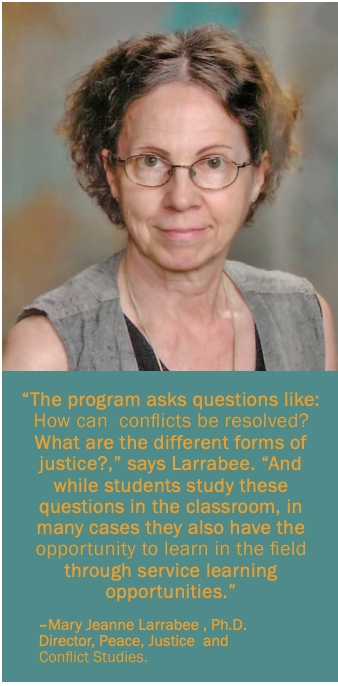
The Steans Center has partnered with PAX to play a pivotal role in
linking students and classes to community organizations at the
forefront of addressing these issues in Chicago and globally. The
program provides students with the skills to reflect on the origins
and causes of violence, as well as exposing them to non-violent
approaches to social change. One defining feature of the program,
says PAX Program Director Dr. Mary Jeanne Larrabee, is how it
explores violence and non-violence on the local,
international, and
global levels. “The program asks questions like: How can conflicts
be resolved? What are the different forms of justice?” says
Larrabee. “And while students study these questions in the classroom, in many cases they also have the opportunity to learn in the
field through service-learning opportunities.” Professor Thomas
O’Brien, former director of the PAX program and an associate professor of religious studies at DePaul, adds that service learning is
an integral part of PAX classes. “Some kind of practical connection
is essential to the learning process,” he says. “Understanding
is about making contact with people who are doing something on
the ground.”
Over the years the PAX minor program steadily attracted interest
to the point where it made sense to offer a major degree program.
“We are encouraging double majors,” Larrabee says. “This program
has a way of reaching a lot of different disciplines. Our idea is,
‘Let’s think about how these might work together – and figure out
what skills you want to develop.” Students who take PAX classes
find that they are linked to a wide variety of disciplines at DePaul
across all colleges and schools. Larrabee adds that classes in the
major can include a wide range of approaches - including research,
novels, film, international studies, website and database development, economics, public relations and advertising and more.
The program offers a range of courses that focus on international
conflicts, human rights, conflict resolution, peace building, activism,
and social justice.

‘Toolbox’ for Engaging Conflicts
Professor Ken Butigan, who has taught nine
courses in the program, says he has witnessed
growing interest in PAX over the years.
Butigan’s expertise in the subject goes back
three decades. Since the early 1980s he’s
been involved in numerous nonviolent social
movements such as the anti-nuclear movement, homeless rights and Central American
peace movements. “There has been a revolution in academia in the past twenty years,
where colleges and universities have increasingly developed peace, justice and conflict
studies programs,” says Butigan. “I am seeing
many programs that seek to provide students
with a vision and toolbox for engaging creatively the conflicts we face every day.” He adds
that studying these subjects gives students
an opportunity to explore critical issues in the
world – and in their own lives. “I ask students
to keep a critical journal,” Butigan says. “I am
often struck by the way they are applying what
they learn to their own personal relationships,
in their families, or with fellow students or
co-workers.” In the Community
Students in Butigan’s class this spring worked
with eight organizations in the city, including
the Brother David Darst Center for Justice &
Spiritual Education and Voices for Creative
Nonviolence. “I think a lot of young people
are craving opportunities to explore the topics
of peace and justice,” says Mindy Rueden,
Executive Director of the Darst Center, a
Chicago-based organization. “I very much
appreciate the opportunity to work with the
Steans Center and Peace Studies program to
get more students in here.” DePaul students
created brochures, wrote a press release for a
local newspaper, worked on the organization’s
website, and helped organize an awarenessraising event for the Center.
Jeff Leys, Executive Director of Voices for
Creative Nonviolence, says he has welcomed
DePaul students from at least seven PAX
classes to the organization including students
from Butigan’s classes. During spring 2010,
four students performed a variety of jobs. Leys
says that staff will sit down with students after
they’ve had a chance to acclimate themselves
“and begin to figure out project niches they
might be able to work on. For example, this
quarter one of the interns did research on the
status of health care in Afghanistan – then
created a flier and fact sheet. Others have
researched the impact of drones used by the
U.S. military in Afghanistan and Pakistan.”
Eventually, the results of DePaul students’
work inform campaigns that engage the public
in dialogue about war and its impact on local
populations.
Rueden and Leys echo each other’s
thoughts about the benefits of having students
at their programs – for the organization as well
as the students. Both emphasize the importance of listening to students and their perspectives about the organization’s work and
challenges. “One of the things we really value
is everyone having an equal voice around the
table,” Rueden says. “We embrace that and
include it in how we develop our marketing
tools.” “Community-based organizations need
to be ready to make the commitment to sit
down with students when they arrive at their
location,” adds Leys. “You have to build opportunities for conversations into the experience.”
Students: Major Where “Theoretical
Meets Practical” 
Recent DePaul graduate Julie Froslan notes,
“having a Peace Studies program at a
university is really important,” say Froslan,
who majored in English and minored in
Women’s and Gender Studies at DePaul. “It
helps to depart from the script that says the
only way to solve conflict is with a tank. Taking
these classes may not change the way you
view conflict, but it will help you consider other
options.”
“For me, the Peace Studies major is where
theoretical meets practical,” adds Nic Cable,
a PAX major. “It’s about being conscious and
engaged citizens.” In an activism class he took during DePaul’s winter quarter, Cable and
nine other students created an event on immigrant justice at DePaul for fellow students.
The group presented a blend of community
and student activists speeches and musical
testimony on the immigration issue. More
than 250 students and community members
stopped by during the three-hour event,
which was titled “Love Without Borders: A
Celebration of Immigration.” Cable helped
manage the event, which he says “raised
awareness of why DePaul students have a
stake in this issue.”
For Emily Anderson, being engaged in
a wide range of activities and causes has
been an essential part of her experience
at DePaul. Anderson says she first became
“addicted” to the study of peace and social
revolution while taking a U.S. history class
in high school. Anderson, who graduated in
June 2010, says she “had so many phenomenal experiences in service learning through
this major.”
Her experiences have included attending a world social forum in Brazil, planning a
Vincentian youth convocation, and – for her
senior capstone project - designing her own
nonprofit organization. For this project, she
planned a community-based school that promotes service learning. In addition, Anderson
and another DePaul student had the opportunity to regularly visit former gang members
at Kolbe House, the Catholic jail ministry
of the Archdiocese of Chicago. “We have a
nonjudgmental, open-minded dialogue with
them about how they got there and what their
experiences have been,” she says. “They have
been grateful to talk with us.” Anderson has
also conducted a literature review on gangs
in Chicago, prison ministries and juvenile
incarceration in the United States. She plans
to work with incarcerated youth and gangs
in Los Angeles.
Anderson says she has learned through
her classroom experience at DePaul that she
is far from alone in her work. “One of the
greatest things I am finding is that this kind
of work is more common and important than
we hear about. I’ve gotten a real sense that
this kind of activism and service has been
going on for years. There’s a real community
and people who have been doing this work
for generations.”
Like all college students, PAX majors face
the inevitable question about how the subject
will apply to their life after graduation.
Larrabee, O’Brien and others emphasize the
practical nature of the Peace Studies major.
“There are many careers connected to or
enhanced by this field,” O’Brien says. “For
example, think about positions at the United
Nations or with nongovernmental organizations.” Careers may fall into the areas of
foreign policy, human rights, social and economic justice, environmental protection, law,
journalism, government and other areas.
Students may also consider voluntary options with programs and organizations such
as the Peace Corps, Amnesty International,
Oxfam and many others.
Meanwhile, Ken Butigan says there is a
message he likes to share with students in
his classes. “I tell them that we have more
power than we think,” he says. “And here are
tools you can use to make change with that
power.” Or, as Emily Anderson put it, “This
degree shows you how you can change
whatever you want. You are empowered.”
